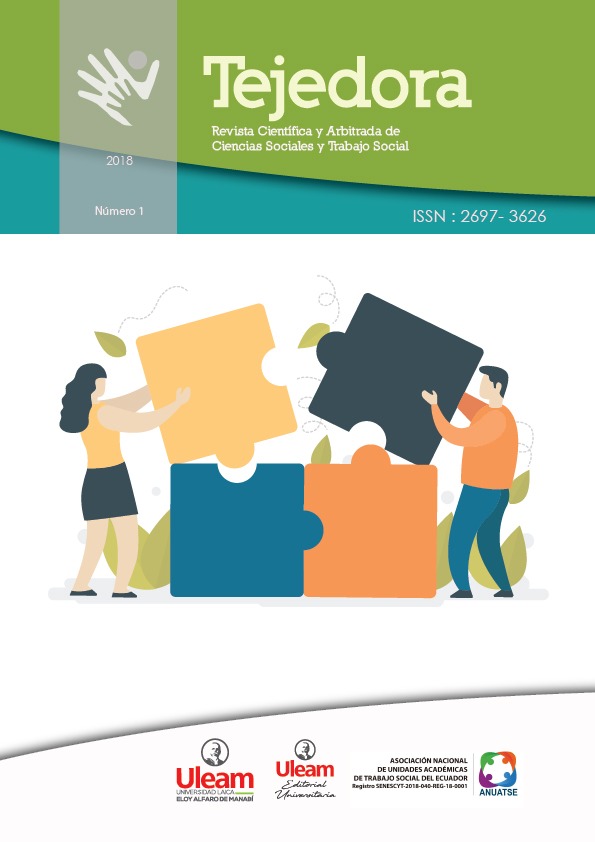DEVIDO PROCESSO, ANÁLISE COMPARATIVA ENTRE O CÓDIGO DE PROCESSO CIVIL E O CÓDIGO ORGÂNICO GERAL DE PROCESSOS
DOI:
https://doi.org/10.56124/tj.v7i13.008Palavras-chave:
Derecho comparado, reforma jurídica, Debido procesoResumo
A comparação integral do Código de Processo Civil com o atual Código Orgânico Geral de Processos responde a um Direito comparado e demonstra que essa mudança de paradigma foi benéfica para a administração da justiça equatoriana, bem como para as pessoas que a ela recorrem diariamente, pois graças à implementação deste novo corpo normativo, foi dada a operacionalidade e a praticidade do devido processo legal estabelecido como garantia fundamental em nossa norma constitucional. A reforma jurídica implementada pela legislação determinou que o princípio da oralidade constitui um avanço positivo no sistema processual equatoriano na medida em que também permitiu ao juiz cumprir sua função com mais eficiência, consolidando assim a aplicação permanente dos princípios de imediatismo, concentração, contradição, publicidade, celeridade, economia processual, entre outros. Embora a escrita ainda esteja em vigor no procedimento equatoriano, sua utilização é mínima e em aspectos essencialmente necessários, como a exigência em seu conteúdo que descreva os fundamentos de fato, os fundamentos de direito, a pretensão do autor e os meios de prova; somando-se a isso sua implementação no momento de documentar tudo o que ocorreu na(s) audiência(s). O devido processo legal evoluiu no Equador, pois permite que as partes obtenham justiça imparcial e oportuna, deixando para trás um sistema ultrapassado em que o juiz julgava apenas com base na leitura de textos, às vezes, muito distantes da realidade.
Downloads
Referências
Bermeo, E. J. (2012). Implementación del Procedimiento Oral para Materias no Penales en el Sistema Jurídico ecuatoriano y el Tratamiento del mismo en el Proyecto de Código General del Proceso. LAW REVIEW, 3-7.
Buenaños Suarez, W. (2017). La evacuación de prueba testimonial. Un estudio comparado entre el Código Orgánico General de Proceso y el Código de Procedimiento Civil. Quito- Ecuador: UISEK. Obtenido de https://repositorio.uisek.edu.ec/bitstream/123456789/2723/1/TESIS%20WILLIAMS%20 BUENA%c3%91O%20FINAL-1.pdf
Cevallos-Cevallos, J. R. (2018). El sistema de valoración de la prueba en el Código de Procedimiento Civil del Ecuador. Revista Derecho y Cambio Social, (54), 271-301.
Garrido, V. S. (2016). Aplicabilidad de los principios de Economía y Celeridad Procesal en El COGEP. Tesis previa a la obtención del título de Abogado de los Tribunales y Juzgados de la República. Riobamba: Universidad Nacional de Chimborazo.
Herrera Carbuccia, M. R. (2008). La Sentencia. Gaceta Laboral, 133-156. Obtenido de http://ve.scielo.org/scielo.php?script=sci_arttext&pid=S1315-85972008000100006
Hidalgo, C. A. (2016). Aplicación del Procedimiento Oral en la Unidad Judicial Primera Especializada de Trabajo del Cantón Quito de la Provincia de Pichincha (Proyecto de Investigación previo a la obtención del Título de Abogado). Quito: Universidad Central del Ecuador.
Locke, K. (2001). Teoría Fundamentada en la investigación de gestión. Londres, Inglaterra: Sage
Pérez, M. J. E. (2010, septiembre 24). “LA VALORACIÓN DE LA PRUEBA, EN LA MOTIVACION DE UNA SENTENCIA EN LA LEGISLACION ECUATORIANA.” Edu.ec. https://repositorio.uisek.edu.ec/bitstream/123456789/2723/1/TESIS%20WILLIAMS%20BUENAÑO%20FINAL-1.pdf
Ramírez, E. (2022). FORMULACIÓN Y SEGUIMIENTO DE PROYECTOS DE INVESTIGACION PARA LA PRÁCTICA JUDICIAL. Manual de Metodología de Investigación Jurídica para la Práctica Judicial, págs. 122-123.
Sanchez, R. (Ed.). (2016). El Código Orgánico General de Procesos ya está vigente. El telegrafo. https://www.eltelegrafo.com.ec/noticias/judicial/12/el-codigo-organico-
General-de-procesos-ya-esta-vigente-en-manabi
Sandoval, C. (1996). Investigación cualitativa.
Stretton, H. (1969). Las ciencias políticas: principios generales de selección en el ámbito social. Ciencias e Historia. Londres. Routledge et al.
Suárez, W. G. B. (2017, diciembre 14). “La evacuación de prueba testimonial. Un estudio comparado entre el Código Orgánico General de Proceso y el Código de Procedimiento Civil.” Edu.ec. https://repositorio.uasb.edu.ec/bitstream/10644/1135/1/T0836-MDP-Escobar-La%20valoración%20de%20la%20prueba.pdf
Urrego Castillo, R. (2020). El efecto de la reforma procesal en la celeridad judicial: evidencia causal para Ecuador. Quito: FLACSO. Obtenido de https://repositorio.flacsoandes.edu.ec/bitstream/10469/17349/2/TFLACSO-2020RAUC.pdf
Villabela, C. (2015). Los métodos de la investigación jurídica. Algunas precisiones. Ciudad de Méxic
Publicado
Como Citar
Edição
Seção
Licença
Copyright (c) 2024 Revista Científica y Arbitrada de Ciencias Sociales y Trabajo Social: Tejedora. ISSN: 2697-3626

Este trabalho está licenciado sob uma licença Creative Commons Attribution-NonCommercial-ShareAlike 4.0 International License.






















